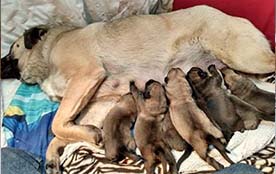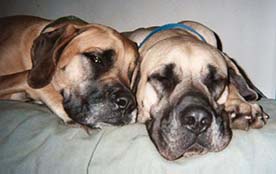American Mastiff Basic Care
FIRST AND FOREMOST; Please be sure your puppy has a safe, secure quiet place for it to sleep and rest. Growing puppies need a lot of sleep; they will wake up, potty, play maybe ten minutes and go back to sleep. The larger the breed the more rapidly it grows, the more sleep it needs. Growing literally wears them out! Please be sure all those in the household know not to disturb the puppy while it is sleeping. Let it wake up on its own; Please tell the smaller children, "puppy sleeping, cannot pet puppy now." (same as with a Human baby, please let the child sleep). American Mastiff puppies who are constantly disturbed when sleepy get grouchy and may even begin to growl at the disturbance. (same as they would to their littermates) Also, Puppies that get picked up and handled too much in the first few weeks at home become sore, they can actually be bruised under the skin, they hurt
when picked up too much, and that makes them very grouchy (same as a human baby). The best way to handle the puppy is have an adult pick it up the way I showed you when you picked it up here at our kennel; have the children sit on couch or floor; Place the puppy with them and show them how to pet it, etc. In this way the puppy learns to trust and love the family. That is what we all want. The better part of raising a puppy is the same common sense you use when you bring a new baby home from the hospital.
More about the Wilck Woodlands American Mastiff Puppy process; Some additional important information:
* We want the puppies we breed to be treated as family members, and as such they absolutely must live in the house with the family. The dog cannot be chained, nor tethered, nor used as a guard dog for any business or non-residential establishment.
* In order for our American Mastiff puppy sales contract to remain in effect, with its warrantees against hip dysplasia and other hereditary or congenital diseases, the following conditions must be met, and documented to every possible extent:
-- A good quality diet and appropriate veterinary care for the life of the dog are required.
-- Caution is required in order to protect young bones and joints. Your American Mastiff puppy should be kept on secure footing, such as carpet, as much as possible. If you have slippery floors, place several rubberized area rugs in each room to create islands of safety. The puppy must be kept from jumping off anything higher than 4-6 inches for first sixteen weeks of its life, and any high-impact activity should be kept to an absolute minimum for the first 18 months. Rough play during puppyhood with larger, more exuberant dogs is particularly risky. It is very important that puppies have socialization and play opportunities with dogs you know are safe, but supervise them closely so undue exuberance can be discouraged.
Exercise "on the flat" is fine, (going for a walk, etc) but the safety of developing skeletal structures must always be kept in mind.
American Mastiff Puppy Safety:
Bare wood floors and tile can be slippery, and running, klutzy puppies run a risk of serious injury. Try to keep your puppy on carpet as much as possible. If you have slippery floors, just pick up several rubberized bath rugs and create islands of safety. This will also help your puppy get used to the floor.Do not let the American Mastiff puppy jump off anything higher than six inches for first sixteen weeks of its life, and do all you can to minimize high-impact activity for the first year to 18 months. Jumping down from heights or over things can injure rapidly developing front legs. Moderate exercise "on the flat" is fine, given you keep the safety of developing bones and joints in mind. walking, etc.
EARLY TRAINING (some of this is repetitive, please read it anyway, very important) Rough play during puppyhood with larger, more exuberant dogs is particularly risky. It is very important that puppies have socialization and play opportunities with dogs you know are safe, but supervise them closely so undue exuberance can be discouraged. Keep in mind that if your puppy is raised with another "hyper" dog, your puppy will learn to be "hyper" which could be a potential danger to his joints and limbs; Mastiffs are bred to be a large, gentle, quiet and calm dog but puppies are definitely influenced by the behavior of the other dogs they come in contact with; It is by far the best to keep your puppy away from very active or "hyper" dogs.
PLAY: never play tug of war or other competitive contact sports with your mastiff. Tug of War encourages aggression as do many other contact sports. It might seem "cute"as a puppy but you should always consider "Do I want this dog to behave this way when he is full grown?" The instinct of this breed is to be quiet and calm; they like to play but not for long periods of time. They love to go for walks, go camping, ride in the car; they want to be with you doing what you do. But they are not long distance hikers and definitely not much for running especially on hot day. They are not a "frisby" dog and most are not much good at agility. They are bred to be a quiet, calm, loving companion. What they will become depends entirely on what they learn as puppies; If they are raised in an environment of rough and tumble activities you will probably end up with an over 200 lb rough and tumble mastiff; Not a good idea. Your puppy wants to PLEASE YOU. So what he sees you doing, he will want to do. Same with children, right? Raising a puppy is much like raising a child. Most is just common-sense reasoning with a picture of a full-grown mastiff always in your mind. Temperament is also largely environmental; Your American Mastiffs puppy's parents are quiet well-behaved Dogs; They are not at all aggressive; Your puppy is well socialized and well behaved the day You pick it up. From that time on what the puppy's temperament will become is largely up to you.
Leaving your American Mastiff Puppy at home while you go to work, etc.
If you need to leave your American Mastiff puppy at home alone (so you can go to work,etc) here is a very good suggestion for you; Prepare a "puppy safe" room such as large bathroom, laundry room, etc. be sure there are no electric wires the puppy can reach or bite thru (instant death). Cover the floor with newspapers, (or the like) so puppy has a place to go "Potty." Place his bed or open-door crate on opposite of the room with water and food always available. The puppy will want to go as far away from his bed and food as possible to "potty." Leave a small TV turned to Animal planet or talk show; or a radio tuned to talk show playing in the room. Be sure it is on high shelf where puppy cannot reach it. Some folks go so far as to record an hour or so of the everyday activities, when the entire family is in home, voices, laughter, table talk, music, etc. They put this cd or tape in player set to repeat when they leave in the morning. Puppy will spend most of his day sleeping, eating, playing with toys, listening to the voices. Works great! this is far and away a much better situation for the puppy than day care. As soon as you get home take the puppy outside to potty; take the soiled newspapers with you and deposit the solids in the spot you want puppy to use in yard. Tell puppy how good he has been all day! After puppy "potties" outside (they will almost always at least urinate when they reach their "spot") take him inside and make a big fuss over him, including him in all the family activities, evenings after work and hopefully all day Saturday and Sunday. As for the "spot in the yard," best to not clean daily at first. Every other day or every third day in cold weather. In summer you may have to clean daily because of the flies. Once the puppy has his spot well established, you can clean daily or immediately if you so choose.Though it's neither possible nor desirable to isolate your dog from any and all possible exposure to pathogens, be cautious about exposing your young puppy to strange dogs or high-traffic "potty" areas, etc., where sick dogs may have been. Limit "sniffing" activity in public areas. Sniffing is not a required component of potty activity and should be kept to a minimum when you're out and about with your dog. (Actually, because dogs love to sniff, some dog trainers effectively use "freedom to sniff at will" as a training reward!) Even at the vet's office, we carry puppies and keep them off the floor until after their third round of shots has been given. Your puppy will not be fully protected by vaccinations until about 24 weeks old.
WE SHUN PUPPY DAY CARE AND DOG PARKS, THOSE ARE DANGEROUS PLACES TO TAKE YOUR PUPPY. Your puppy is much better left at home alone in safe area than left at a day care center for dogs. Any questions or problems please call.
-

Please click here to learn about upcoming litters and puppies for sale.
Read more >> -

Please click here to see our personal breed dogs.
Read more >> -

Please click here to see our American Mastiff Puppy Care and training Guide.
Read more >>
